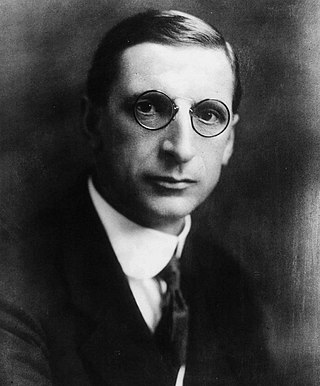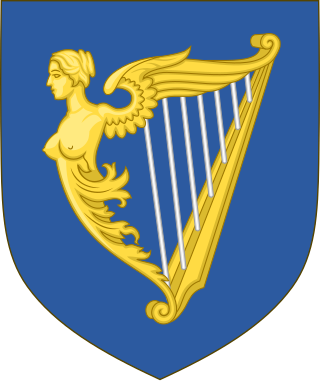The Liberal Unionist Party was a British political party that was formed in 1886 by a faction that broke away from the Liberal Party. Led by Lord Hartington and Joseph Chamberlain, the party established a political alliance with the Conservative Party in opposition to Irish Home Rule. The two parties formed the ten-year-long coalition Unionist Government 1895–1905 but kept separate political funds and their own party organisations until a complete merger between the Liberal Unionist and the Conservative parties was agreed to in May 1912.

The Irish component of the 1918 United Kingdom general election took place on 14 December 1918. It was the final United Kingdom general election to be held throughout Ireland, as the next election would happen following Irish independence. It is a key moment in modern Irish history, seeing the overwhelming defeat of the moderate nationalist Irish Parliamentary Party (IPP), which had dominated the Irish political landscape since the 1880s, and a landslide victory for the radical Sinn Féin party. Sinn Féin had never previously stood in a general election, but had won six seats in by-elections in 1917–1918. The party had vowed in its manifesto to establish an independent Irish Republic. In Ulster, however, the Unionist Party was the most successful party.

The Irish Parliamentary Party was formed in 1874 by Isaac Butt, the leader of the Nationalist Party, replacing the Home Rule League, as official parliamentary party for Irish nationalist Members of Parliament (MPs) elected to the House of Commons at Westminster within the United Kingdom of Great Britain and Ireland up until 1918. Its central objectives were legislative independence for Ireland and land reform. Its constitutional movement was instrumental in laying the groundwork for Irish self-government through three Irish Home Rule bills.

The 1892 United Kingdom general election was held from 4 to 26 July 1892. It saw the Conservatives, led by Lord Salisbury again win the greatest number of seats, but no longer a majority as William Ewart Gladstone's Liberals won 80 more seats than in the 1886 general election. The Liberal Unionists who had previously supported the Conservative government saw their vote and seat numbers go down.

The 1886 United Kingdom general election took place from 1 to 27 July 1886, following the defeat of the Government of Ireland Bill 1886. It resulted in a major reversal of the results of the 1885 election as the Conservatives, led by Lord Salisbury, were joined in an electoral pact with the breakaway Unionist wing of the Liberals led by Lord Hartington and Joseph Chamberlain. The new Liberal Unionist party elected 77 members and gave the Conservatives their parliamentary majority, but did not join them in a formal coalition.

The Government of Ireland Bill 1886, commonly known as the First Home Rule Bill, was the first major attempt made by a British government to enact a law creating home rule for part of the United Kingdom of Great Britain and Ireland. It was introduced on 8 April 1886 by Liberal Prime Minister William Gladstone to create a devolved assembly for Ireland which would govern Ireland in specified areas. The Irish Parliamentary Party had been campaigning for home rule for Ireland since the 1860s.

Justin McCarthy was an Irish nationalist, journalist, historian, novelist and politician. He was a Member of Parliament (MP) from 1879 to 1900, taking his seat in the House of Commons of the United Kingdom of Great Britain and Ireland.

The Irish Unionist Alliance (IUA), also known as the Irish Unionist Party, Irish Unionists or simply the Unionists, was a unionist political party founded in Ireland in 1891 from a merger of the Irish Conservative Party and the Irish Loyal and Patriotic Union (ILPU) to oppose plans for home rule for Ireland within the United Kingdom of Great Britain and Ireland. The party was led for much of its existence by Colonel Edward James Saunderson and later by St John Brodrick, 1st Earl of Midleton. In total, eighty-six members of the House of Lords affiliated themselves with the Irish Unionist Alliance, although its broader membership among Irish voters outside Ulster was relatively small.

The Redistribution of Seats Act 1885 was an Act of the Parliament of the United Kingdom. It was a piece of electoral reform legislation that redistributed the seats in the House of Commons, introducing the concept of equally populated constituencies, a concept in the broader global context termed equal apportionment, in an attempt to equalise representation across the UK. It mandated the abolition of constituencies below a certain population threshold. It was associated with, but not part of, the Representation of the People Act 1884.
William Archibald Macdonald was an Irish nationalist politician and MP in the House of Commons of the United Kingdom of Great Britain and Ireland and as member of the Irish Parliamentary Party represented Queen's County Ossory, 1886–92, and a supporter of Charles Stewart Parnell. He was one of the small number of blind people who have ever been members of the UK House of Commons.
In parliamentary politics, balance of power is a situation in which one or more members of a parliamentary or similar chamber can by their uncommitted vote enable a party to attain and remain in minority government. The term may also be applied to the members who hold that position. The members holding the balance of power may guarantee their support for a government by either joining it in a coalition government or by an assurance that they will vote against any motion of no confidence in the government or will abstain in such a vote. In return for such a commitment, such members may demand legislative or policy commitments from the party they are to support. A person or party may also hold a balance of power in a chamber without any commitment to government, in which case both the government and opposition groupings may on occasion need to negotiate for that person's or party's support.

The Home Rule movement was a movement that campaigned for self-government for Ireland within the United Kingdom of Great Britain and Ireland. It was the dominant political movement of Irish nationalism from 1870 to the end of World War I.
William Pirrie Sinclair was a politician in the United Kingdom who was twice elected to the House of Commons for the Liberal Party.
The 1890 Bassetlaw by-election was a parliamentary by-election held for the British House of Commons constituency of Bassetlaw in Nottinghamshire on 15 December 1890.
The 1899 Edinburgh South by-election was a parliamentary by-election held for the UK House of Commons constituency of Edinburgh South in Scotland on 19 June 1899.
The 1886 Derby by-election was a parliamentary by-election held for the House of Commons constituency of Derby, the county town of Derbyshire on 9 February 1886.
The 1911 North Tyrone by-election was a Parliamentary by-election. North Tyrone returned one Member of Parliament (MP) to the House of Commons of the United Kingdom, elected by the first past the post voting system. The by-election was held on 6 October 1911.

The 1892 general election in Ireland took place from 4–26 July 1892. This was the first general election in Ireland following the split in the Irish Parliamentary Party caused by Charles Stewart Parnell's relationship with Katharine O'Shea, who had been married at the beginning of their relationship. The ensuing scandal saw the Party split into rival wings; the anti-Parnellite Irish National Federation, and the pro-Parnellite Irish National League. Parnell later died in October 1891 of a heart attack.
The 1887 Taunton by-election was held on 23 April 1887 in Taunton, Somerset, following the succession of the incumbent, Samuel Charles Allsopp, to the peerage upon the death of his father, becoming 2nd Baron Hindlip. One of Lord Hindlip's brothers, Alfred Percy Allsopp, stood for the Conservative Party, while James Harris Sanders was the candidate for the Liberal Party. Allsopp was elected, with a majority of 536 votes (23.1%).
The issue of Ireland has been a major one in British politics, intermittently so for centuries. Britain's attempts to control and administer the island, or parts thereof, have had significant consequences for British politics, especially in the 19th and 20th centuries. Although nominally autonomous until the end of the 18th century, Ireland became part of the United Kingdom of Great Britain and Ireland in 1801.












